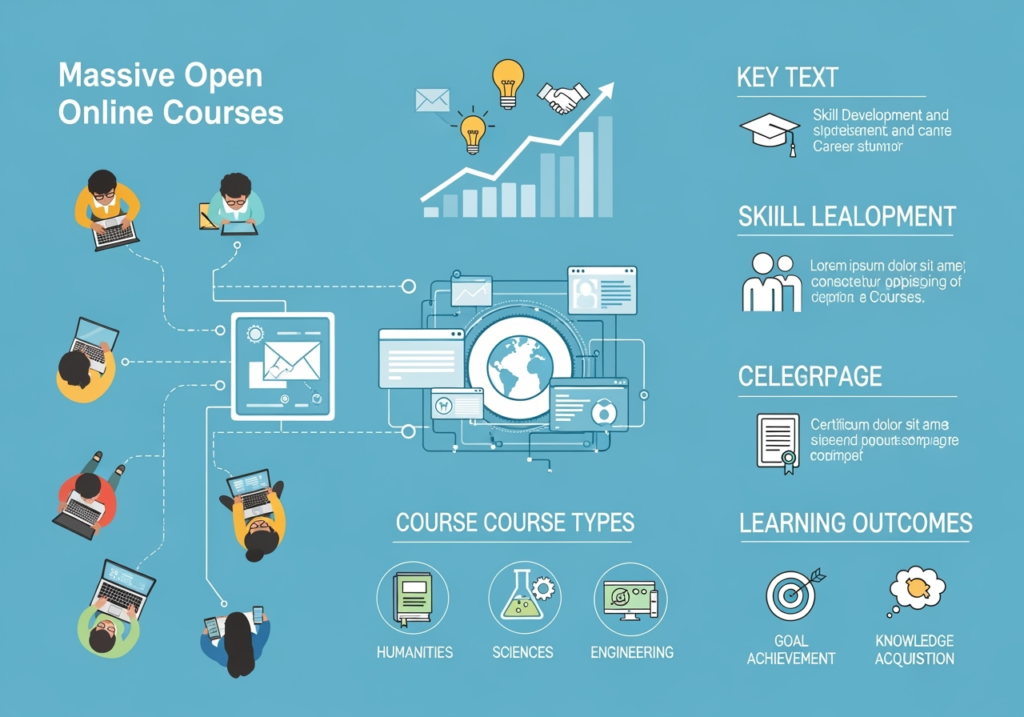Should you invest time in Massive Open Online Course (MOOC)?

Are MOOCs a transformative landmark in higher education? To know continue reading this post to learn what is MOOCs and what are their utilities.
‘Education for All’ has been a long-time vision of the United Nations since the 1990s. This began with the Millennium Development Goals that are currently replaced by the Sustainable Development Goals (abbreviated as SDGs). Until 2020, the last major innovation that came about in education was the printing press and the course book. However, with the emergence of the worldwide pandemic, the entire concept of education has transformed and is constantly evolving. COVID-19 has driven us to rethink the mechanisms of teaching and learning.
What is MOOC?
Massive Open Online Course is abbreviated as MOOCs. These online courses are introduced on a portal. MOOCs offer loads of reading material, lectures, worksheets, and videos so that learners can refer to those materials to improve their learning.
Apart from the traditional mechanisms of teaching namely lectures, reading materials, and videos; MOOCs also present a platform for interactive, collaborative, and shared forums. It is also considered one of the personalized e-learning methodologies that assist self-paced learning which remains focused on the skills that the learners wish to sharpen.
What’s unique about Massive Open Online Course (MOOC)?
MOOCs were developed from the notion of covering complete university courses online and in that way making them accessible to everybody across the world.
The primary intention was to “democratize” education and make educational content available to one and all from elite universities.
Superior quality education need not be available to only a few selected groups of university goers in developed nations, but rather to everyone willing to learn-from Alabama to India.
Why are MOOCs so popular?
Receiving education has become more and more important and at the same time gradually more difficult beyond the high school level. Establishments of higher education present impediments in the form of entrance examinations, living expends, traveling expenses, tuition, and many more. Throughout the world, there are higher education institutions that are opening their doors by offering virtual education to students in the format of MOOCs.
Ivy League Institutions such as Harvard in Boston are offering Massive Open Online Courses that range from data science to biotechnology. Besides top-tier institutions providing free courses, business enterprises such as Apple also provide free course creation tools for educators over iTunes.
Many other tools are available through platforms namely Coursera, Udemy, edX, and many others. Many other corporations and universities are also creating open online learning formats for anyone interested in learning.
MOOCs can be classified into two categories – cMOOCs and xMOOCs
cMOOCs- cMOOCs are Massive Open Online Courses that permit the dynamic development of study materials (notes, video lessons, exercise programs, and other documents). The materials will be developed through online dialogs and collaborations among learners undertaking the course across the world.
xMOOCs– Conversely, xMOOCs, rely on the traditional method where the courses are well-designed with pre-designed reading and reference resources.
MOOC: cMOOCs and xMOOCs
WHY MOOCs?
The question is why should you spend time learning when you don’t receive any college credit out of the course?
MOOCs deliver several benefits worth the time spent in learning. This segment presents the utilities of MOOCS (advantages and benefits of enrolling for MOOCs).
Advantages of Massive Open Online Courses (abbreviated as MOOCs)
1. Offer a wide variety of subjects of different discipline
College time schedules are tight, therefore you might not be able to undertake every course that you intend to. Your school might not even offer a subject that you are keenly interested in learning. So, this is where MOOCs can assist you. You can look for interesting courses on the website of MOOC providers. The courses offered by MOOC providers range from yoga, meditation, foreign language, and soft skill development to financial markets, engineering, biotechnology, data science to English composition. In some cases, you can also choose to select a paid course to receive college credit for all the heavy labor you put in.
2. Courses are offered for free or sometimes reasonably priced
Many free online courses are accessible for anybody interested to enroll. Massive Open Online Courses are sometimes paid courses that are reasonably priced. So, these are affordable and at the same time flexible ways to pick up new skills.
3. They’re accessible
MOOCs are open to one and all. Another major advantage of MOOC is that there are no prerequisites for enrolling and MOOC learning. Therefore, you can just sign up and register for any course irrespective of your academic background or age. Just be enthusiastic about learning and be ready to put in the effort.
4. Courses are available to a vast and diverse audience across the globe
MOOCs or open online courses are mainly aimed at unrestricted participation and open access through the Web. Thus, courses are available to a wide range of audiences across the globe.
5. Performance Tracking
Learners’ performance can be supervised and scrutinized easily using the captured data during the courses
6. Worldwide exposure
Both educators and learners can receive worldwide exposure, consequently enhancing pedagogical techniques and procedures of knowledge sharing.
7. MOOCs are offered in diverse languages
The options of your courses are not just constrained based on where you stay. You can enjoy courses delivered in foreign nations without any hesitancy (you can follow the subtitles if needed).
8. Support your college and/or scholarship applications to stand out
Anything you do during your undergraduate program to show future college admissions (maybe masters) that you’re determined about learning will support your application. Knowledge acquired from MOOCs will also support branch or interest-oriented scholarship applications and interviews. Additionally, undertaking these massive open online courses also shows resourcefulness, initiative, enthusiasm, and intellectual curiosity. These attributes are of a prosperous student and a successful professional in the future.
9. Improve your job applications and career prospects
Employers seek various soft skills in their prospective employees. There are certain degree programs that aid students acquire these skills. MOOCs also help in bridging the gap between college graduates and professionals in the workplace. Several MOOC providers offer free “soft skill” courses that help in covering subjects ranging from teamwork and office communication to public speaking. Also, they deliver paid professional courses that are certified.
Undertaking MOOCs in a niche segment can also assist you to secure a job. For instance, say you’re an English major graduate applying to jobs as a copywriter for a web development firm. Taking a MOOC on elementary web design or basic HTML coding will certainly help you gain an edge over other applicants.
Which are the key MOOC providers?
Here are the most popular ones:
Stunited is also offering free MOOCs for training candidates and making them future-ready. Click here to sign up today and enroll in a course for free.
Unsure of your career path? Need help?
Contact Us:
Phone:01604328800
Whatsapp:+44 7558999784
Email:hr@stunitedjobs.org
Find more such articles on on Careers, Jobs, and Internships in the UK and Education here at Stunited News Feed!
Get your CV, LinkedIn Profile, and Job Application Letter designed by our experts here – Stunited. Try Now
Apply for Part-time/Full-Time/Internship Jobs here -Stunited Jobs Portal
#UKInternship #summerinternship2022 #summerinternship #paidinternship #UKJobs #UKjobsearch #UKjobseekers #Stunited #StunitedNewsfeed #StunitedJobs #Stunitedorg #mooc #edxcourses #edxlogin #mooccourses #whatmooc #edxharvard #edxfreecourses #freemooc #whymooc #edxcertificate #futurelearnmooc #udemymooc #onlinecourses #






















